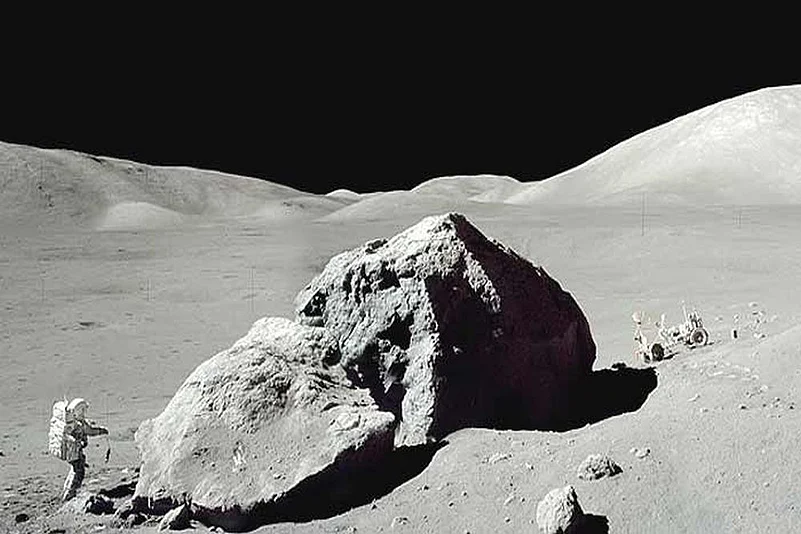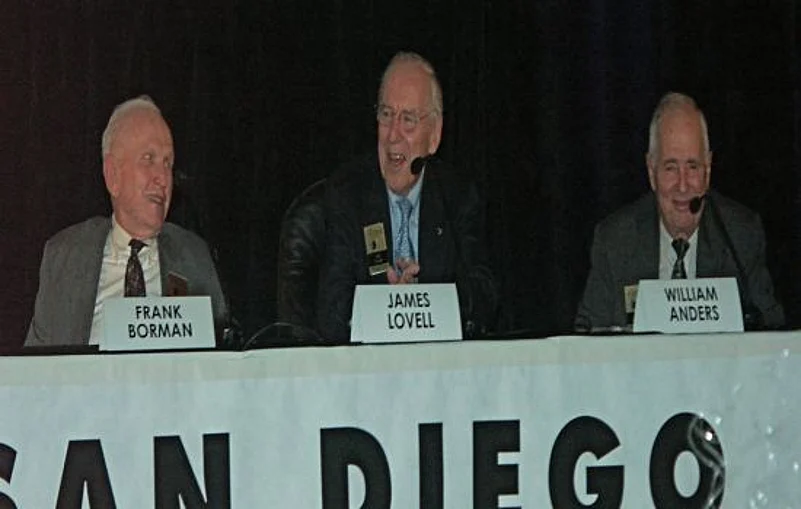The Christmas Eve in 1968 was when three Apollo 8 astronauts read from the Book of Genesis on live TV as they orbited the moon.
NASA's Apollo 8 Celebrates 50th Anniversary Of First Voyage To Moon
That first voyage by humans to another world in 1968 set the stage for the still grander Apollo 11 moon landing seven months later.

To this day, that 1968 mission is considered to be NASA's boldest and perhaps most dangerous undertaking. That first voyage by humans to another world set the stage for the still grander Apollo 11 moon landing seven months later.
There was an unprecedented and unfathomable risk to putting three men atop a monstrous new rocket for the first time and sending them all the way to the moon. The mission was whipped together in just four months in order to reach the moon by year's end, before the Soviet Union.
There was the Old Testament reading by commander Frank Borman, Jim Lovell and Bill Anders.
Lastly, there was the photo named "Earthrise," showing our blue and white ball — humanity's home — rising above the bleak, grey lunar landscape and 240,000 miles (386 million kilometres) in the distance.
Humans had never set eyes on the far side of the moon, or on our planet as a cosmic oasis, surrounded completely by the black void of space. A half-century later, only 24 US astronauts who flew to the moon have witnessed these wondrous sights in person.
The Apollo 8 crew is still around: Borman and Lovell are 90, Anders is 85.

To Lovell, the journey had the thrill and romance of true exploration and provided an uplifting cap for Americans to a painful, contentious year marked by the assassinations of Martin Luther King Jr. and Robert Kennedy, nationwide riots and protests of the Vietnam War.
The mission's impact was perhaps best summed up in a four-word telegram received by Borman. "Thanks, you saved 1968."
NASA Administrator Jim Bridenstine — who at age 43 missed Apollo — marvels over the gutsy decision in August that year to launch astronauts to the moon in four months' time. He's pushing for a return to the moon but with real sustainability this next go-around.
The space agency flipped missions and decided that instead of orbiting Earth, Borman and his crew would fly to the moon to beat the Soviets and pave the way for the lunar landings to come. And that was despite on its previous test flight, the Saturn V rocket lost parts and engines failed.
"Even more worrisome than all of this," Bridenstine noted earlier this month, Apollo 8 would be in orbit around the moon on Christmas Eve and Christmas Day.
"In other words, if there was a failure here, it would wreck Christmas not only for everybody in the United States but for everybody in the world." As that first moon shot neared, Borman's wife, Susan, demanded to know the crew's chances. A NASA director answered: 50-50.
Borman wanted to get to the moon and get back fast. In his mind, a single lap around the moon would suffice. His bosses insisted on more.
"My main concern in this whole flight was to get there ahead of the Russians and get home. That was a significant achievement in my eyes," Borman explained at the Chicago launch of the book "Rocket Men" last spring.
Everyone eventually agreed: Ten orbits it would be.
Liftoff of the Saturn V occurred on the morning of Saturday, December 21, 1968.
On Christmas Eve, the spaceship successfully slipped into orbit around the moon. Before bedtime, the first envoys to another world took turns reading the first 10 verses from Genesis. It had been left to Borman, before the flight, to find "something appropriate" to say for what was expected to be the biggest broadcast audience to date.
"We all tried for quite a while to figure out something, and it all came up trite or foolish," Borman recalled. Finally, the wife of a friend of a friend came up with the idea of Genesis.
"In the beginning," Anders read, "God created the heaven and the Earth ..." Borman ended the broadcast with, "And from the crew of Apollo 8, we close with good night, good luck, a Merry Christmas, and God bless all of you — all of you on the good Earth."
On Christmas morning, their spacecraft went around the moon for the final time. The engine firing needed to shoot them back to Earth occurred while the capsule was out of communication with Mission Control in Houston.
Lovell broke the nervous silence as the ship reappeared: "Please be informed there is a Santa Claus." Back in Houston, meanwhile, a limousine driver knocked on Marilyn Lovell's door and handed her a gift-wrapped mink stole with a card that read: "To Marilyn, Merry Christmas from the man in the moon." Lovell bought the coat for his wife and arranged its fancy delivery before liftoff.
Splashdown occurred in the pre-dawn darkness on December 27, bringing the incredible six-day journey to a close. Time magazine named the three astronauts "Men of the Year." It wasn't until after the astronauts were back that the significance of their Earth pictures sank in.
(AP)
























